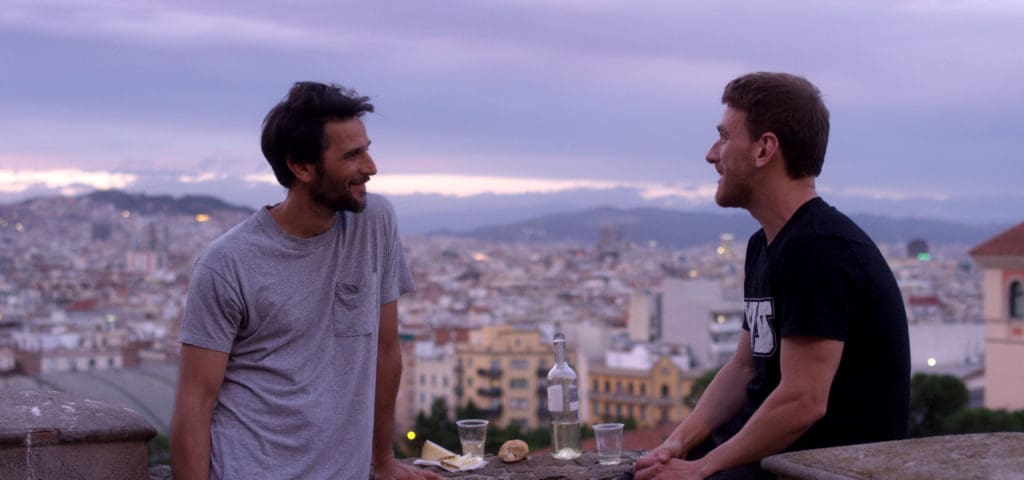
End of the Century is the kind of movie that sneaks up on you. Written, directed and edited by Lucio Castro in his feature début, it starts by following Ocho (Juan Barberini), an Argentinian poet vacationing in Barcelona in an impossibly chic Airbnb. Lonely and unsatisfied with swiping through Grindr, he spends the film’s first minutes in silence, mostly looking at Javi (Ramón Pujol), a man wearing a KISS t-shirt who seems to pop up everywhere. The pair eventually hook up, but while their encounter initially seems casual, Castro soon reveals the characters have a history. Though that reveal is perhaps the film’s biggest surprise, it’s far from the only unexpected turn and Castro keeps the audience constantly engaged in his melancholy love story.
Still, before the big reveal, what initially makes End of the Century so surprising is its bracing frankness. We not only see Ocho walking through the city or eating but watch him resignedly pleasuring himself when he’s forced to go to bed alone. The film is so matter of fact when it comes to sex that it feels almost subversive—not just as a piece of queer cinema, but as cinema in general. A scene of Ocho and Javi talking about protection quickly cuts to them nude and opening the condoms Ocho had to go to the store to get. That said, Castro’s straightforward approach to those scenes isn’t smutty, but a realistic depiction of two people connecting physically.
In truth, the far more titillating frankness is in the dialogue itself. In the scene before Ocho and Javi end up in bed together, they talk about how they both expected the other to make the first move when they encountered each other at the beach earlier in the day. The conversation is flirty and sweet and perfectly delivers on the chemistry the actors generate purely through furtive glances in earlier scenes. That same easy conversation carries into the scenes that follow their tryst too and while that’s in some part meant to express the depth of their connection, it also serves to make the revelation that this isn’t their first meeting even more surprising.
However, even though that reveal happens relatively quickly, Castro spends the film’s middle gradually relaying the details. It’s perhaps best not to say precisely how Ocho and Javi first met but suffice to say it was 20 years prior, during the titular turn of the century. Granted, it’s not initially easy to tell just how long ago that first meeting was. Not only does Castro abruptly transition to that part of the story, but Barberini and Pujol play the characters in both timelines and look relatively the same in both. Even after Javi makes a reference to wanting to make a film about the year 2000, it will likely be difficult for some viewers to suspend their disbelief and buy into that conceit.
Still, while that choice will be a sticking point for some, keeping the same actors in both timelines not only maintains the potent chemistry between the characters, but allows Castro to more poignantly explore the way this romance has affected both people over time. Where Ocho wants a lot of kids during their first encounter, it’s Javi who waxes poetic about the way having children forces a parent to think selflessly in the present timeline. Where Ocho decides to quit his job and become a poet in the past, we see in the present that he’s still doing poetry on the side, spending the bulk of his days doing marketing for an airline. In essence, Castro attempts to do in one film what Richard Linklater has done over three films in his Before series. It’s an ambitious goal, but one that Castro pretty much pulls off in a relaxed, beautifully filmed summertime mode that still manages to leave a sense of lingering melancholy.
Simply put, End of the Century is a stunning directorial début for Castro. With its confident storytelling, beautiful cinematography and effortlessly real central performances, it’s the mark of a stunning new voice in cinema. The film’s pacing and mood may be gentle and unassuming, but Castro finds deep emotional power in his characters that’s sure to leave even the most cynical viewers feeling wistful.

